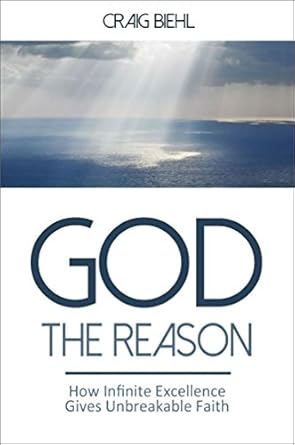Reviewed by Mark Farnham
Like all apologists, Craig Biehl wants you to defend the Christian faith, but he wants you to do it from the foundation of a deep and abiding knowledge of God. His book, God the Reason: How Infinite Excellence Gives Unbreakable Faith is a systematic exploration of the person of God and its implications for apologetics. Rather than answer systems of unbelief primarily from a logical perspective, he shows how the resources of theology give us many of the answers we need to give an answer to objections to the Christian faith.
This is a decidedly presuppositional approach to apologetics (or covenantal, as Scott Oliphint prefers), and as a result spends much time in Scripture to flesh out the distinctively Christian God. As the book unfolds, the reader begins to gain a sense of awe in the exposition of God’s being and nature. The richness of God’s character as a foundation for apologetics is a sharp contrast to the often dry and empty philosophy that undergirds many apologetics books. This volume exalts the person and power of the living God. It is personal, not impersonal, concrete rather than abstract. Each chapter develops one attribute of God through the lens of implications for living and defending the faith.
Another distinctive found throughout this work is Biehl’s emphasis on the fact and clarity of God’s revelation to man. This is the critical point missed in so many discussions of apologetics. Revelation is often reduced to the minimum — the possibility or capacity for man to know God. This leaves the apologist with little with which to work. By positing a robust doctrine of revelation that is universal, clear, and guarantees knowledge of God in the unbeliever, Biehl writes from a fertile foundation of truth that cuts through the pallid protestations of unbelievers.
Throughout his discussion on the nature of God, Biehl incorporates philosophy, conversations with unbelievers, and current issues. He frequently practices one of Cornelius Van Til’s guiding principles, taking the opponent’s position for the sake of the argument. This tactic is effective for the simple reason that it leads the unbeliever on a path of self-understanding as the implications of his worldview and foundational beliefs are carried to their logical end. Biehl demonstrates that he is fluent enough in linguistics, science, and other disciplines to expose the unsupported assumptions on which they rely.
Reading Biehl reminds me of Vern Poythress’s many books on various academic disciplines (such as sociology, linguistics, math, and logic), because every chapter is chock full of Scriptural examples to elucidate the ideas he is explaining. This style opens the reader’s eyes to the incredible theological depth of Scripture. Every passage in Scripture has immense epistemological, metaphysical, and ethical wisdom, and Biehl excels in extracting those truths from the whole of the Bible.
Much more could be said about the virtues of this book, but suffice it to say that it is a significant contribution to apologetics literature. It is easily clear enough to put in the hands of a layman, but also profound enough to challenge and edify the scholar. I recommend that you get a copy as soon as you can.
Mark Farnham (PhD, Westminster Theological Seminary) is Associate Professor and Coordinator of Pastoral and Preseminary Majors at Lancaster Bible College.
